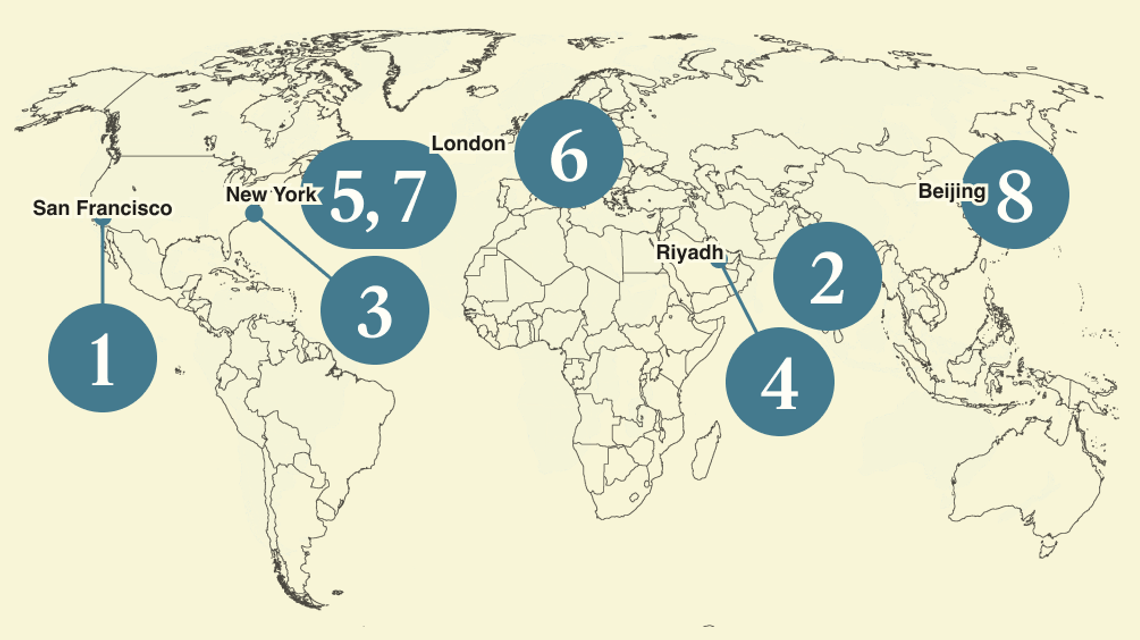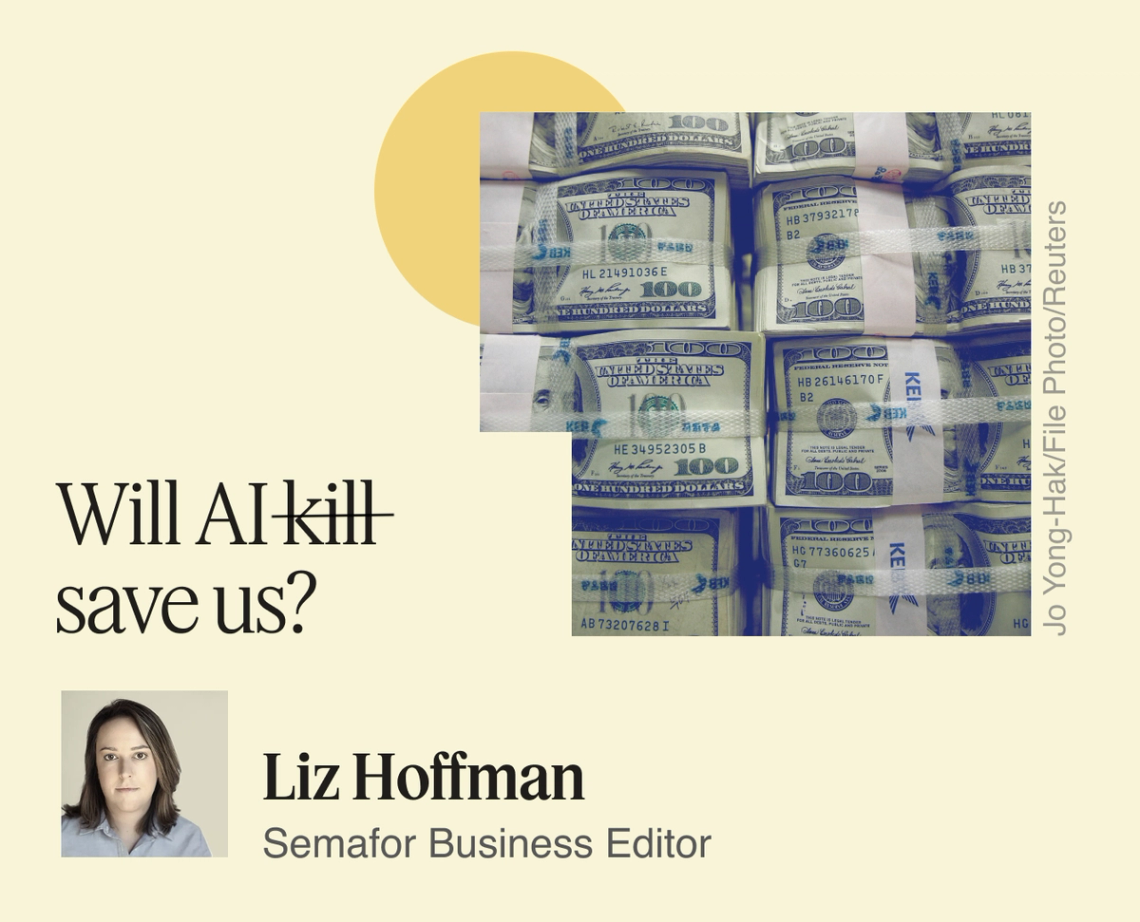| | In this edition, is AI the way out of America’s debt hole? And a pizza scoop. ͏ ͏ ͏ ͏ ͏ ͏ |
| |  | Business |  |
| |
|
 - ICE to target employers
- Another Boeing crash
- Bessent defends ‘revenge tax’
- Pizza LBO with a Gulf twist
- Wall Street’s recruiting pause
- AI swallows Cannes
- A PE playbook, tested
- Spheres of influencers
 UK’s Poundland sells for less than that… |
|
 “There are five ways out,” David Rubenstein told me in Washington this week, ticking through America’s options to deal with its $36 trillion national debt. The Carlyle co-founder was a debt hawk before it was fashionable, sounding the alarm in the post-2008 days of free money and Barack Obama’s technocratic optimism. The political center has shifted Rubenstein’s way with startling speed, hastened by President Donald Trump’s deficit-widening tax cuts. “One, you cut spending, but no one wants to do that,” he told me. “Two, you increase taxes, and we don’t like to do that. Three, you can go to the IMF for a bailout,” at which point I realize we’re entering strange territory. “Four, you can say [to your creditors] ‘Look, we’re sorry’ and default.” Uh oh. The fifth option is for the economy to grow its way out of the hole. It’s a bet that a combination of AI, tax cuts, AI, energy independence, and AI will unleash productivity gains not seen since the 19th century and let America’s earnings catch up with its borrowings. It’s first-year business-school math: how much debt a company carries relative to how much money it makes. When that ratio gets too high, as America’s is now, you can either decrease the numerator or raise the denominator.  But big economies grow slowly. “We’re talking about a $28 trillion economy,” Rubenstein said. “Can you grow it at 5% or 6%?” Excluding the pandemic snapback, the US economy hasn’t strung together consecutive quarters of annualized 4% growth since 1999, when the economy was less than half the size it is now and deep into a stock market bubble. The Trump administration economic advisers are annoyed at this line of reasoning. They say a 3% growth rate is more than sufficient to shrink the debt over time. Maybe because of Silicon Valley’s influence on the White House, they’re more bullish on AI and more likely to see it ushering in a “fourth industrial revolution.” I’m not an economist, or Semafor’s AI expert. (Sign up for Semafor Tech, written by my colleague Reed Albergotti!) I’m only pointing out that even Trump’s critics and allies seem to agree that the US’ best shot to defuse a debt bomb is the same thing overleveraged private-equity portfolio companies will say this year when creditors come knocking: AI, trust us. Plus: Semafor’s Ben Smith and Max Tani are heading to Cannes next week for media and marketing’s biggest event. Whether you’ll be on the Côte d’Azur or just want to keep up on yacht talk, subscribe to Semafor Cannes. |
|
Trump border czar: ‘massive’ employer crackdown |
 Eduardo Munoz/Reuters Eduardo Munoz/ReutersThe Trump administration will civilly and criminally prosecute companies that have employed migrant workers, White House border czar Tom Homan said in an interview with Semafor’s Ben Smith Wednesday, a new dimension of risk for executives. “Worksite enforcement operations are going to massively expand,” he said. “They’re coming here for a better life and a job and I get that… If they can’t get a job, most of them aren’t going to come.” Putting heat on employers that, knowingly or not, depend on undocumented workers would shake huge segments of the US economy and undercut two of Trump’s campaign promises: make housing more affordable and keep food prices down. As we reported Tuesday, almost a quarter of construction workers and as many as half of meatpacking workers lack legal status. Further reading: Stepped-up immigration enforcement is pressuring brands that rely on Latino customers, WSJ reports, as shoppers stay home rather than risk getting caught in a dragnet. Coca-Cola, Colgate and Constellation have all felt the hit. |
|
Indian plane crash renews Boeing worries |
 Amit Dave/Reuters Amit Dave/ReutersA fresh tragedy has reignited concerns about Boeing and clouded the tenure of its new CEO. An Air India Dreamliner crashed Thursday morning, killing more than 200. It’s the first serious challenge for Kelly Ortberg, who took the top job in August with a mandate to restore the company’s engineering prowess and safety culture. Shares fell more than 5% in morning trading Thursday. Customers will be keeping a sharp eye on the fallout. “I do think Boeing has turned the corner,” United CEO Scott Kirby, who was one of the jetmaker’s loudest critics during its safety lapses, said at Semafor’s World Economy Summit earlier this year. “It’s not gonna happen overnight, you know. It’ll take decades to get there.” |
|
Bessent defends ‘revenge tax’ |
 Elizabeth Frantz/Reuters Elizabeth Frantz/ReutersTreasury Secretary Scott Bessent defended a provision in the Trump-supported megabill that has Wall Street on edge. Dubbed the “revenge tax,” it would apply to US investments by foreigners from countries that tax digital services offered by US companies — like the UK’s 2% digital service tax or Poland’s 1.5% levy. The proposed tax, which would start at 2% and go as high as 20%, “will allow us to prevent our corporate revenues from being drained into foreign treasuries, and that is in the hundreds of billions of dollars,” Bessent testified Wednesday. The administration’s tariff policy has mostly focused on goods, in the hopes of reviving American manufacturing and securing supplies of critical hardware like semiconductors. But the US’ biggest export is its brainpower, in the form of streaming apps and financial advice. On Wednesday’s upbeat inflation report: Economists say prices haven’t yet risen because companies stockpiled inventories ahead of Trump’s tariffs. But those looking for evidence of a tariff-wrecked economy will have to keep waiting. |
|
A $2B pizza deal draws Qatari royal |
 Taber Andrew Bain/Flickr/CC BY 2.0 Taber Andrew Bain/Flickr/CC BY 2.0Apollo and an investment fund backed by a member of Qatar’s royal family have offered $2 billion to buy Papa John’s, people familiar with the matter told Semafor’s Rohan Goswami. It’s an unlikely pairing: Apollo, one of Wall Street’s deepest pockets; and Irth Capital, which is backed by Sheikh Mohamed “Moe” al Thani and managed just $190 million as of Dec. 31, regulatory filings show. With Papa John’s stock trading around $48 a share before Semafor’s scoop Wednesday, the consortium made a bid in the low $60s, people familiar with the matter said. |
|
Wall Street’s recruiting détente has an AI shadow |
 Spencer Platt/Getty Images Spencer Platt/Getty ImagesFinally, a pause in the Wall Street recruiting frenzy. Apollo told prospective investment-banking candidates that it won’t interview or extend offers to the class of 2027 this year, Bloomberg reports, after bank executives complained about investment firms raiding their junior employees. If others follow, the move would restore a bit of sanity to a process that has become nonsensical over the past decade, with private-equity firms dangling future-dated job offers to grads just weeks out of college. JPMorgan has complained loudly about the practice, which CEO Jamie Dimon has called “unethical,” and threatened to fire anyone who accepted such an offer. But there’s another angle worth watching: Financial firms are grappling with how AI will change their need for junior employees, whose bread-and-butter work — making PowerPoints, running Excel models — is already being done by AI agents. Delaying their recruiting buys time. |
|
AI anxiety at Cannes Lions |
 Benoit Tessier/Reuters Benoit Tessier/ReutersBrands and the media companies hungry for their advertising dollars are heading to the French Riviera next week for the Cannes Lions conference. But the gathering was swallowed years ago by Big Tech, whose AI rush will define the next age of advertising. It’s not just anxiety from creative types. Rather, the rise of AI has given a retroactive purpose to the dominance of Meta, Google, and, to a degree, TikTok, which together control about half of digital advertising. It used to be conventional to complain that “the best minds of my generation are thinking about how to make people click ads,” but it turns out the real product these tech giants were building was AI. Their ad revenue has funded Nobel-winning breakthroughs in AI at Google and underwritten the nine-figure salaries Meta is reportedly dangling in front of top AI talent. Some of that money will trickle down to lavish beachfront parties next week on the Riviera, where the industry’s other players — the big advertising companies, the publishers, and smaller tech firms — bicker over the crumbs. — Ben Smith |
|
An $8B test of PE’s rollup playbook |
A private-equity playbook is about to get tested. Hellman & Friedman and Warburg Pincus are seeking a buyer for Edelman Financial Engines, a network of financial advisors they built by acquiring small teams and solo operators. The $8 billion asking price, related by people close to the process, struck a few bidders as ambitious. Edelman is a classic roll-up — a trendy PE strategy but one that hasn’t been validated by big exits. The idea is to combine mom-and-pop establishments into sizable companies with centralized purchasing, smarter sales tactics, better technology, and fatter profits. There are optometry rollups, carwash roll-ups, laundromat roll-ups, and multiple financial advisory firm roll-ups, of which Edelman is the oldest and one of the biggest. The question: Now what? |
|
|